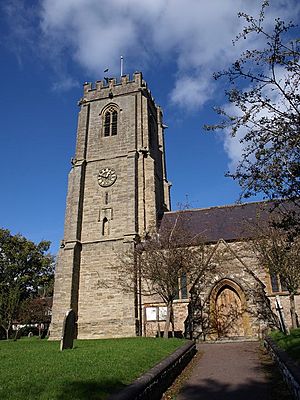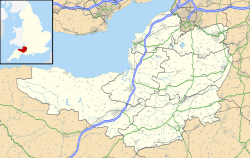Church of All Saints, Norton Fitzwarren facts for kids
Quick facts for kids Church of All Saints |
|||||||||||||||||||
|---|---|---|---|---|---|---|---|---|---|---|---|---|---|---|---|---|---|---|---|
 |
|||||||||||||||||||
| 51°01′42″N 3°08′45″W / 51.0282°N 3.1457°W | |||||||||||||||||||
| OS grid reference | ST197260 | ||||||||||||||||||
| Location | Norton Fitzwarren | ||||||||||||||||||
| Country | England | ||||||||||||||||||
| Denomination | Anglican | ||||||||||||||||||
| Website | |||||||||||||||||||
The Church of All Saints is an old and beautiful church located in Norton Fitzwarren, a village in Somerset, England. It is an Anglican church, which means it belongs to the Church of England. This historic building was first built a very long time ago, either in the late 1200s or early 1300s. The church is part of the Taunton area's church group, which is called a deanery. It also belongs to the larger diocese of Bath and Wells. The Church of All Saints is considered a Grade II* listed building, meaning it is a very important historical building that needs to be protected. ContentsHow the Church is UsedThe Church of All Saints is an active part of the Church of England. It works together with another church, the Church of St John, Staplegrove. These two churches form what is called a "United Benefice." This means they share the same leader, who is currently The Reverend Paul Irving. Both churches are located within the Taunton deanery and the diocese of Bath and Wells. They work together to serve their local communities. History and Design of the ChurchThe Church of All Saints was originally built around the late 13th or early 14th century. Over the years, it has been updated and repaired. In the mid-1800s, the church had two major restoration projects. During these times, the entrance porch and the chancel (the part of the church where the altar is) were rebuilt. A vestry, which is a room used by the clergy, was also added. The church is built from a type of stone called North Curry sandstone. It also has special decorative stone called hamstone and a roof made of slate. The Church TowerThe church has a tall tower at its western end. This tower has a special top edge called a crenellated design, which looks like the top of a castle wall. The tower also has strong supports called buttresses that stick out. At each of the tower's three levels, you can see gargoyles on the corners. These are carved stone figures, often shaped like animals or monsters, that were originally used to drain water from the roof. On the south side of the tower, there is a clock and an empty space where a statue might have once stood. The tower also features beautiful stained glass windows from the 1800s. Inside the ChurchInside the church, the main walkway (called the nave) has a row of strong, eight-sided pillars. These pillars are topped with simple, flat designs called capitals. The church was officially recognized as a Grade II* listed building in February 1955 because of its historical and architectural importance. The church also has a special wooden screen from the early 1500s. This screen, called a rood screen, once stretched across the entire width of the church, separating the nave from the chancel. Now, it is split into parts. The lower section of the screen has carvings that tell the story of the Dragon of Norton Camp. The GraveyardThe southwest part of the church's graveyard is thought to have been a burial place for traveling people, sometimes historically referred to as Gypsies. See also
|
|||||||||||||||||||
 | Audre Lorde |
 | John Berry Meachum |
 | Ferdinand Lee Barnett |


